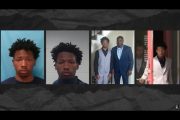
The trial of the third of six officers charged in the April 2015 death of Freddie Gray begins this week in Baltimore. The first two trials ended in a hung jury and an acquittal. In the second case, involving Officer Edward Nero, Judge Barry Williams said that the prosecution, headed by State’s Attorney for Baltimore Marilyn Mosby, failed to prove any of the charges brought by Mosby: second-degree assault, reckless endangerment, or misconduct in office.
In this week’s trial, the stakes are even higher. Mosby has yet to win a case, yet she is asking for a conviction for something even more serious, called “depraved heart” murder. She is also asking Judge Williams, in a bench trial, to convict Officer Caesar Goodson (shown, center), the driver of the van transporting Gray, of involuntary manslaughter, second-degree assault, two manslaughter-by-vehicle charges, and misconduct.
Much of what happened on April 12, 2015 is now public knowledge. Gray was arrested for allegedly possessing an illegal switchblade knife and placed in a police van to take him to the precinct station for booking. There were six officers involved, including Goodson, the driver of the van. In the van was another suspect being transported as well.
Testimonies given by the officers and the suspect in the previous trials indicated that Gray became violent to the extent that officers were unable to fasten his seatbelt as ordinarily required. So violent, according to testimonies, that he began to rock the van from side to side. At some point he apparently hit his head against the inside of the van so violently that he broke his neck, severing his spinal cord, which led to his death seven days later.
On May 1 Mosby announced that the medical examiner had ruled Gray’s death a homicide and charged all six officers with crimes that included everything from false arrest and illegal imprisonment to murder. A grand jury indicted them on all charges (except false arrest and illegal imprisonment) while adding a couple of its own: reckless endangerment and misconduct in office.
Doubts are increasing that Mosby will be any more successful in bringing more serious charges against Goodson than she was in bringing lesser charges against the first two officers. Some have accused her with overreaching — “overcharging” — in the incident, asking for everything and hoping for something. In the Nero case, the judge ruled that Nero (and by implication the others as well) acted reasonably since Gray was exceedingly uncooperative and violent, noting that Nero acted as “any reasonable officer” would have in the same circumstances. He further ruled that charges that the officers somehow caused Gray’s injury by not buckling him in simply did not stand up to scrutiny.
She is going to have to prove an even higher level of guilt by asking for conviction for “depraved heart” murder. As Scott Calvert explained in the Wall Street Journal:
Standard jury instructions in Maryland describe second-degree murder as “the killing of another person while acting with an extreme disregard for human life.” Depraved heart murder is a type of second-degree murder that doesn’t require an intent to kill, but prosecutors must prove that Officer Goodson caused Mr. Gray’s death, knew his actions created a “very high degree of risk” of death and acted “with extreme disregard of the life endangering consequences.”
Law professors teaching the concept use examples of a gunman firing randomly into a passing train, or thugs dropping concrete blocks onto a busy highway: they aren’t intent on killing a specific individual but are operating with a total disregard for anyone whom their actions might kill.
In this particular case, Mosby is going to have to prove to the judge’s satisfaction that Goodson drove the van in such a manner as to cause the injury to Gray that resulted in his death. That is called a “rough ride”: driving a vehicle in a way that allows officers to inflict personal injury on a suspect in order to punish or injure him. In an interview with David Jaros, a law professor at the University of Baltimore, David Graham, a writer for The Atlantic, asked why Mosby can’t seem to get a conviction. Said Jaros: “It’s a pretty significant [jump] from [depraved murder] to failing to buckle someone into a van.”
Which raises the question: Why does Mosby continue in her fight? It appears to many to be a matter of police persecution rather than a search for justice. Perhaps she is trying to make a “statement” — that police violence against innocents cannot be condoned in any circumstances. Perhaps she is trying to build her resume for future advancement. Perhaps she is trying to ingratiate herself with the radicals who have deliberately burned the city following Gray’s death. Or perhaps it’s her strange way of approving the appeasement — some say the buy off — of the city in its $6.4 million award to Gray’s family to settle a lawsuit that hasn’t even been filed yet.
The stakes in the Goodson trial are high, but the outcome appears, in the absence of new evidence, likely to be the same: acquittal. If the Goodson case is dismissed, it’s likely also to result in the end of Mosby’s overreaching as well. It might also mean that the cases pending against the other three officers will be withdrawn, in the interest of justice and fair play.
Photo: AP Images
A graduate of an Ivy League school and a former investment advisor, Bob is a regular contributor to The New American magazine and blogs frequently at LightFromTheRight.com, primarily on economics and politics. He can be reached at [email protected].
Related articles:
Officer in Freddie Gray Case Found Not Guilty on All Charges




